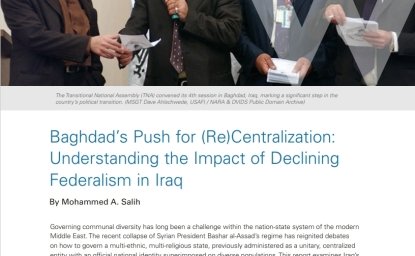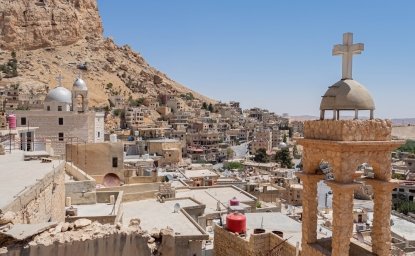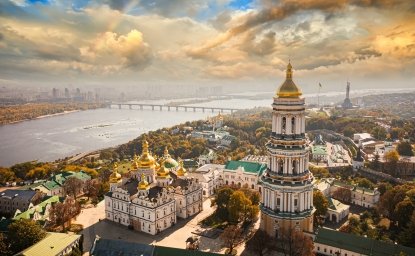Blasphemy and apostasy laws were applied in a discriminatory manner in several Middle Eastern and North African countries in 2012, according to a new report by the U.S. State Department. “These laws are frequently used to repress dissent, to harass political opponents, and to settle personal vendettas,” Secretary of State Kerry said on May 20. In Saudi Arabia, activists were reportedly arrested and charged with apostasy and blasphemy. Under Egypt’s new constitution, prosecutors pursued cases against individuals for denigrating religion. Sectarian violence also plagued several countries, including Bahrain, Iraq, Lebanon, and Syria. The following are excerpts arranged by country, with a link to the full text at the end.
Algeria
The constitution provides for religious freedom, but other laws, policies, and practices sometimes restrict religious freedom. The trend in the government’s respect for religious freedom did not change significantly during the year. The constitution declares Islam the state religion and prohibits institutions from engaging in behavior incompatible with Islamic morality. Other laws and regulations provide Muslims and non-Muslims the freedom to practice their religion as long as they respect public order, morality, and the rights and basic freedoms of others. However, non-Muslim groups experienced difficulty when attempting to register with the government…
There were reports of societal abuses or discrimination based on religious affiliation, belief, or practice. Although society generally tolerated foreigners and citizens who practiced religions other than Islam, Algerian Jews and some Algerian Muslims who converted to Christianity kept a low profile due to concern for their personal safety and potential legal and social problems. Violent extremists continued to refer to interpretations of religious texts to justify their killing of security force members and civilians. Muslim religious and political leaders publicly criticized acts of violence committed in the name of Islam…
Bahrain
The constitution does not explicitly protect freedom of religion, but does provide for freedom of worship, and the government generally respected the right of citizens and foreign residents to practice their religion. The trend in the government’s respect for religious freedom did not change significantly during the year. The Sunni Muslim citizen population enjoyed favored status. The country experienced some sectarian violence and predominately Shia groups conducted regular demonstrations and protests calling for political reform. The government increasingly scrutinized clerics’ sermons, arrested members of the Shia community, including clerics, and stripped the citizenship of 31 Shia citizens, including three clerics, it deemed posed a security threat to the country. There were allegations of excessive use of force, torture, and mistreatment of detainees arrested during protests. The government took steps to implement the Bahrain Independent Commission of Inquiry (BICI) recommendations related to the Shia community, such as reinstating many Shia governmental and parastatal employees who were dismissed in 2011, and rebuilding some of the Shia religious sites that were destroyed in 2011…
Egypt
The Constitutional Declaration of March 2011 and the new constitution ratified on December 22 provide for some freedom of religion, but certain constitutional provisions, laws, and government policies and practices limit that freedom. The government’s respect for religious freedom remained poor during the year. While the 2012 constitution stipulates that “freedom of belief is an inviolable right,” some provisions provide less protection than the previous constitution… Like previous constitutions, it stipulates that Islam is the official religion of the state and the principles of Sharia (Islamic law) are the primary sources of legislation. Some interpret Article 4 of the new constitution as granting Al Azhar, the country’s preeminent center of Sunni Islamic jurisprudence, the authority to define and interpret Sharia; others believe the constitution leaves this authority primarily with the courts. The new constitution explicitly prohibits offending or criticizing religious prophets and messengers, whereas in the past demeaning or defaming Islam, Christianity, or Judaism was prohibited only by law…
While recognized and unrecognized religious minorities mostly worshiped without harassment, the government generally failed to prevent, investigate, or prosecute crimes against members of religious minority groups, especially Coptic Christians, which fostered a climate of impunity… The government also sometimes arrested, detained, or harassed members of minority Muslim sects. The government routinely failed to condemn incendiary speech, including anti-Semitic and anti-Christian speech…
Iraq
The constitution provides for religious freedom and the government generally respected religious freedom in practice. The trend in the government’s respect for religious freedom did not change significantly during the year. The constitution recognizes Islam as the official religion, mandates that Islam be considered a source of legislation, and states that no law may be enacted that contradicts the established provisions of Islam. However, it also states that no law may contradict principles of democracy or the rights and basic freedoms stipulated in the constitution… Officials sometimes misused their authority to limit freedom for religious groups other than their own. However, the government continued to call for tolerance and acceptance of all religious minorities, provided security for places of worship such as churches, mosques, shrines, and religious pilgrimage sites and routes, and funded the construction and renovation of places of worship for some religious minorities. Al-Qaeda in Iraq (AQI) and other terrorist and illegally armed groups committed violent attacks that restricted the ability of all believers to practice their religion…
Jordan
The constitution and other laws and policies provide for religious freedom, with some exceptions, and in practice, the government generally respected religious freedom. The trend in the government’s respect for religious freedom did not change significantly during the year. The constitution stipulates that the state religion is Islam, but provides for the freedom to practice the rites of one’s religion and faith in accordance with the customs that are observed in the country, unless they violate public order or morality… Members of unrecognized religious groups faced legal discrimination. The government continued to monitor members of the Bahai Faith, a few Muslim converts to Christianity, and some citizens and foreign residents suspected of proselytizing Muslims. Security services continued to monitor Christian churches and leaders for their protection, which Christians generally welcomed…
Kuwait
The constitution provides for religious freedom; however, other laws and policies restrict religious freedom and, in practice, the government generally enforced these restrictions. The constitution states that Islam is the state religion and that Sharia (Islamic law) is a main source of legislation. The trend in the government’s respect for religious freedom did not change significantly during the year. There were negative developments, such as municipal authorities obstructing private, unofficial religious gatherings and the emir issuing an emergency decree that expands the laws that prohibit insulting religious groups. The Council of Ministers rejected amendments passed by the parliament that would have made blasphemy a capital crime for Muslims. Courts sentenced several individuals to time in prison for blasphemy and denigrating religious sects. Religious minorities experienced discrimination as a result of government policies…
Lebanon
The constitution and other laws and policies protect religious freedom and, in practice, the government generally respected religious freedom. The constitution declares equality of rights and duties for all citizens without discrimination or preference but establishes a balance of power among the major religious groups. The trend in the government’s respect for religious freedom did not change significantly during the year.
There were reports of societal abuses or discrimination based on religious affiliation, belief, or practice. There was tension among religious groups, attributable in part to competition for political power, and citizens continued to struggle along sectarian lines with the legacy of a 15-year civil war (1975-90). Rising regional tensions, inflamed by the sectarian overtones of the Syrian conflict, were also a source of friction between some religious communities…
Libya
The interim constitution protects religious freedom and, in practice, the government generally respected religious freedom. The trend in the government’s respect for religious freedom did not change significantly during the year. Following the fall of the Qadhafi regime after the 2011 revolution, the new government ceased actively regulating all aspects of religious life. Qadhafi-era laws that restrict religious freedom remained, but the government did not regularly enforce them. The government was limited in its ability to prevent violent extremist groups from taking advantage of the post-revolution security vacuum to attack religious minorities.
There were reports of societal abuses based on religious affiliation, belief, or practice. Two Egyptian nationals were killed in an attack on a Coptic Church in Misrata in December. Salafist groups vandalized and destroyed Sufi religious sites on several occasions, including most prominently in downtown Tripoli and Zliten in August. Salafists are fundamentalist Sunni Muslims. Salafists also threatened Sufi individuals and religious sites…
Morocco
The constitution and other laws and policies protect religious freedom but, in practice, the government restricted religious freedom in some cases. The trend in the government’s respect for religious freedom did not change significantly during the year. The constitution stipulates that Islam is the official state religion and designates the King as Commander of the Faithful (‘amir al-mu’mineen) and Defender of the Community and the Faith (hami hama al-milla wa ad-din) in the country. The government continued to respect the right of the vast majority of citizens to practice their religion, although government policies discouraged conversion from Islam and prohibited efforts to proselytize Muslims… Some Moroccan Christians reported decreased police harassment. The government continued to restrict the distribution of non-Islamic religious materials, as well as some Islamic materials that did not follow the Maliki school of Sunni Islam to which the monarchy adheres. Several small religious groups practiced with varying degrees of official restrictions…
Qatar
The constitution stipulates that Islam is the state religion, and national law incorporates both secular legal traditions and Sharia (Islamic law). In practice, the government generally respected religious freedom, with some restrictions. Sunni and Shia Muslims practiced freely. Practitioners of other religions generally worshipped in specially designated or private locations. The government restricted public worship, prohibited non-Muslims from proselytizing, monitored religious expression in the media and on the Internet, and required formal registration of religious groups that some found cumbersome. The law recognizes only Islam, Christianity, and Judaism. The trend in the government’s respect for religious freedom did not change significantly during the year.
Saudi Arabia
Freedom of religion is neither recognized nor protected under the law and the government severely restricted it in practice. According to the 1992 Basic Law, Sunni Islam is the official religion and the country’s constitution is the Quran and the Sunna (traditions and sayings of the Prophet Muhammad). The trend in the government’s respect for religious freedom did not change significantly during the year… The government generally permitted Shia religious gatherings and non-Muslim private religious practices. Some Muslims who did not adhere to the government’s interpretation of Islam faced significant political, economic, legal, social, and religious discrimination, including limited employment and educational opportunities, underrepresentation in official institutions, restrictions on religious practice, and restrictions on places of worship and community centers. The government executed at least one individual sentenced on charges of “witchcraft and sorcery” during the year. There were fewer reported charges of harassment and abuse for religious reasons at the hands of the Committee for the Promotion of Virtue and Prevention of Vice (CPVPV) compared with the previous year, although online criticism of the organization increased...
Syria
The constitution and other laws and policies protect religious freedom, although the government imposed restrictions on this right. The government’s respect for religious freedom declined during the year. The constitution provides for freedom of faith and religious practice as long as religious rites do not disturb the public order. The government increased its targeting and surveillance of members of faith groups it deemed a “threat,” including members of the country’s Sunni majority. This occurred concurrently with the escalation of the civil conflict that resulted in the regime killing 35,000 civilians between the start of the uprising in 2011 and year’s end. Such targeting included killing, detention, and harassment. There were credible reports that the regime targeted citizens based on religious affiliation in mixed neighborhoods in Homs and rural Aleppo…
There were reports of societal abuses or discrimination based on religious affiliation, belief, or practice. While opposition to the government began as a series of peaceful protests calling for reform and an end to regime abuses, the regime framed the protests and subsequent armed resistance in sectarian terms, maintaining that protesters and oppositionists were associated with “extreme Islamist factions.” At times, some protesters associated the entire Alawi minority with the regime, holding Alawis accountable for the regime’s brutality and killing of civilians. Consequently, Alawis were particularly targeted for reprisal as tensions, violence, and killing rose between Sunni and Alawi communities…
Tunisia
The constitution and other laws and policies largely provide for religious freedom so long as its practice “does not disturb public order.” In practice, the government enforced some restrictions on this freedom, including pressing charges against citizens for disseminating material deemed “offensive” to religious sensibilities. The 1959 constitution remains in force and stipulates that Islam is the official religion and the state seeks to “remain faithful to the teachings of Islam.” The National Constituent Assembly (NCA), elected in October 2011, continued its work to draft a new constitution. Religious minorities complained that the government took inadequate steps to protect their communities from harassment, vandalism, and intimidation. The government took steps to promote interfaith tolerance and ease restrictions on religious association. The trend in the government’s respect for religious freedom did not change significantly during the year.
There were reports of societal abuses and discrimination based on religious affiliation, belief, or practice. Salafists (fundamentalist Sunni Muslims) attacked targets they deemed “un-Islamic,” such as a Russian Orthodox Church, synagogues, and dozens of Sufi shrines including the Saida Manoubia Shrine. Salafists also issued anti-Semitic messages, as did some imams during Friday prayer sermons…
Turkey
The constitution and other laws and policies generally protect religious freedom, although there are some laws, policies, and constitutional provisions that restrict religious freedom. There were reports of abuses of religious freedom, including the imprisonment of at least one conscientious objector for his religious beliefs. The trend in the government’s respect for religious freedom did not change significantly during the year. In general, members of religious groups that had formal recognition during the Ottoman period, including the Greek Orthodox, Armenian Orthodox, Syrian Orthodox, Armenian Protestant, and Jewish communities, reported they had freedom to practice their faiths... The ban on headscarves remained in effect in government offices and public primary schools, but the government did not enforce it in universities and in some workplaces...
There were reports of societal abuses and discrimination based on religious affiliation, belief, or practice. Christians, Bahais, many non-Sunni Muslims, including the sizeable Alevi population, and members of other religious minority groups faced threats and societal suspicion. Jewish leaders reported some elements of society continued to express anti-Semitic sentiments. Persons wishing to convert from Islam experienced harassment and violence from relatives and neighbors…
United Arab Emirates
The constitution guarantees the “freedom to exercise religious worship…in accordance with established customs, provided that it does not conflict with public policy or violate public morals.” The government generally respected religious freedom in practice, with some restrictions. The trend in the government’s respect for religious freedom did not change significantly during the year. The constitution declares that Islam is the official religion of all seven of the constituent emirates of the federal union and defines all citizens as Muslims... The government followed a policy of tolerance towards non-Muslim religious groups, with some exceptions.
Yemen
The constitution does not specifically protect religious freedom, and other laws, policies, and government practices restrict it. The constitution declares that Islam is the state religion and Sharia (Islamic law) is the source of all legislation. It effectively limits the presidency to practicing Muslims, while not imposing similar restrictions on other government offices. The constitution generally allows Muslims of different sects and followers of religious groups other than Islam to worship according to their beliefs; however, the government prohibits conversion from Islam and efforts to proselytize Muslims. The trend in the government’s respect for religious freedom did not change significantly during the year. Terrorist groups, including Al Qaeda in the Arabian Peninsula (AQAP) and its affiliate Ansar al-Sharia, committed abuses during their occupation of the cities in Abyan. These groups imposed their religious interpretations through harassment, floggings, amputations, and murder, including crucifixions, during their occupation...
Click here for the executive summary and links to individual country sections.




